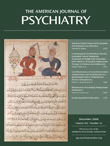Dr. Levav Replies
To the Editor: Together with some pertinent reflections, Peggy Bosch and Maurits van den Noort raise an important question in their letter. They asked, “Has the Israeli population, that has endured terrorist acts and wars over the years, reached a ceiling in their service utilization patterns, and therefore we were not able to elicit an increase in the use of specialized services during the study period?” For this purpose, they suggested to compare the service use in Israel with that of other nonterrorized countries. Thanks to the World Health Survey/World Mental Health Survey (1) , we could do that. The specialized or general health services utilization for psychiatric reasons in a single year in Israel was 8.5%, close to the World Mental Health Survey European and U.S. figures: Italy, 4.5%; Ukraine, 4.9%; Spain, 7.3%; Germany, 7.8%; Netherlands, 10.7; Belgium, 11.0%; France, 12.4%; and the United States, 15.3% (2) .
Also note that there was no increase in new contacts during the 1991 Gulf War in the major mental health center in Tel Aviv, although city residents were exposed nightly to the Iraqi scud missiles. As it might eventually occur in Jerusalem, the new contacts in Tel Aviv seemed to have increased during a 2-month period following the end of the attacks (personal communication).
We agree fully with the authors that studies are needed to investigate why people seek and do not seek help from specialized services in times of crisis.
1. WHO World Mental Health Survey Consortium: Prevalence, severity, and unmet need for treatment of mental disorders in the World Health Organization World Mental Health Surveys. JAMA 2004; 291:2581-2590Google Scholar
2. Levinson D, Lerner Y, Zilber N, Grinshpoon A, Levav I: Twelve-month service utilization rates for mental health reasons:d from the Israel National Health Survey (INHS). Isr J Psychiatry (in press)Google Scholar



